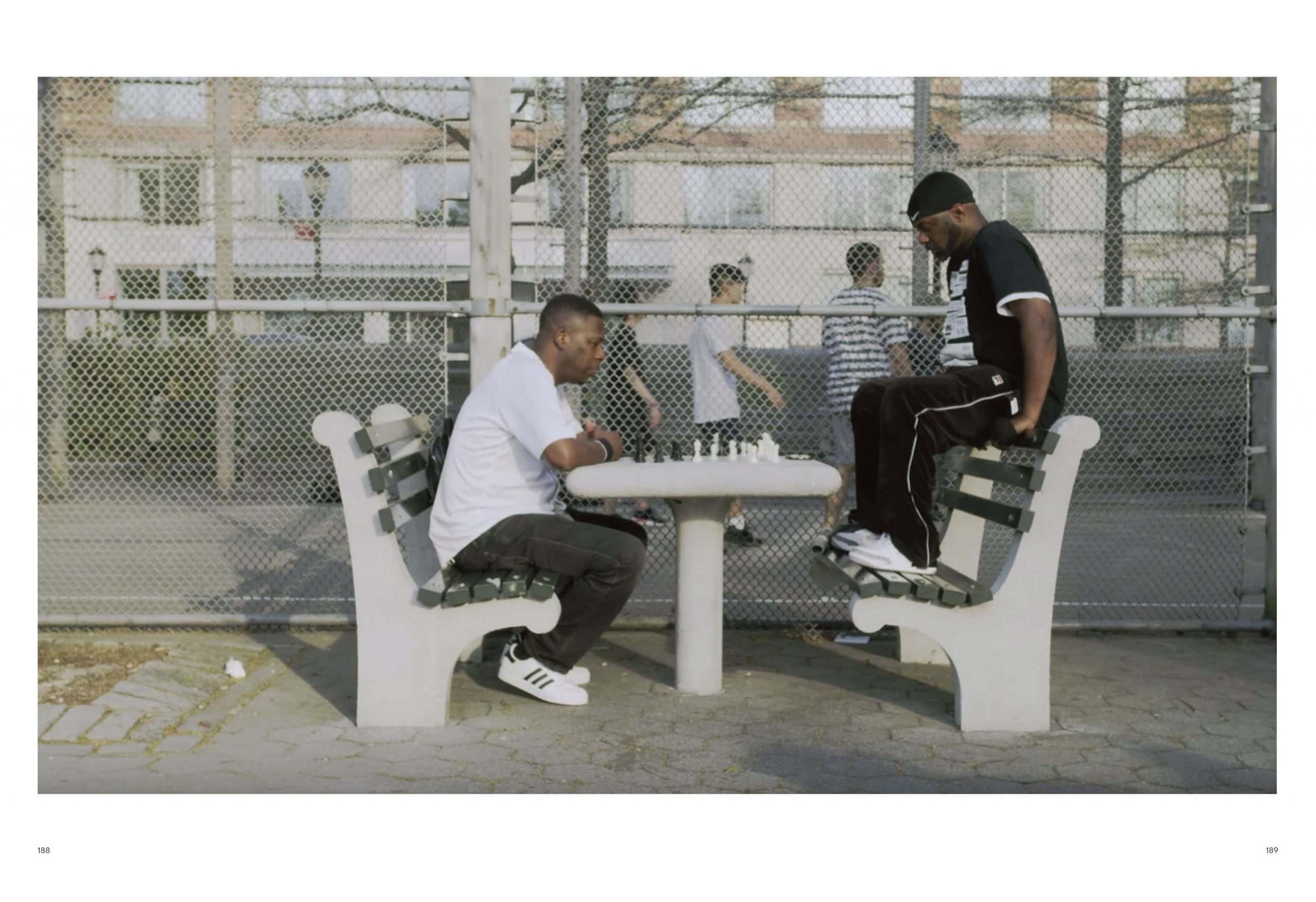
In the 1920s, Marcel Duchamp claimed to no longer be making art, and began to devote considerable time to chess. He’d grown up battling with his older brothers, Raymond and Jacques, and in his later years he entered chess Olympiads, hand-carved a now iconic set, and wrote weekly newspaper columns on the subject.
Duchamp found the game playful, cerebral, and creative. “Chess pieces,” he once said, “although making a visual design on the chessboard, express their beauty abstractly, like a poem.” A less abstract form of beauty that Duchamp enjoyed was playing games with his friends dressed up as chess pieces.
Chess Players: From Charlie Chaplin to Wu-Tang Clan, published by Fuel in association with World Chess and FIDE. Photo courtesy of Fuel.
One such game appears inside a new book of photographs documenting the rich interplay between chess and culture over the past 130 years. The scene is a Connecticut lawn in 1956; Duchamp sits in the nook of a tree and faces off against Hans Richter, the avant-garde artist and Dada historian. Friends are costumed in barrels, conical hats, and capes. The scene would appear in Richter’s experimental film 8×8: A Chess Sonata in 8 Movements (1957).
Left: Duchamp from beneath chess table. Right: garden game from Connecticut in 1956 from Chess Players: From Charlie Chaplin to Wu-Tang Clan, published by Fuel in association with World Chess and FIDE. Photo courtesy of Fuel.
The book, Chess Players: From Charlie Chaplin to Wu-Tang Clan, spotlights the countless cultural icons who have found stimulation, fun, and friendship in the 1,500-year-old game. The glossy coffee table book has been published by World Chess and FIDE, the International Chess Federation, which is celebrating its 100th anniversary.
The book’s goal is to “expand chess beyond the board” and “to gain a bigger foothold in pop culture,” said World Chess, by showing that the game isn’t just serious business carried out in the tense atmosphere of tournament halls. Basically, it wants to remind people that chess is cool, which has largely been the organization’s mission since forming in 2012.
Anatoly Karpov in a demonstration game in the USSR in 1978, from Chess Players: From Charlie Chaplin to Wu-Tang Clan, published by Fuel in association with World Chess and FIDE. Photo courtesy of Fuel.
“Chess is everything: art, science and sport,” Anatoly Karpov, the chess world champion from 1975 to 1985, once said. The book makes the case for this claim through hundreds of artful and oftentimes surprising photographs.
We meet a young, pensive David Hockney, who plays a game with fellow artist Patrick Proctor in the south of France. “Drawing is rather like chess,” the book quotes Hockney. “Your mind races ahead of the moves you eventually make.” On the facing page, celebrated commercial illustrator Raymond Savignac poses beside a poster design for a 1950 tournament.
Left: Raymond Savignac with his chess poster. Right: David Hockney plays with Patrick Proctor, from Chess Players: From Charlie Chaplin to Wu-Tang Clan, published by Fuel in association with World Chess and FIDE. Photo courtesy of Fuel.
Greater star power arrives with the actors. John Wayne plays on the set of 1958’s Rio Bravo; his audience includes John Russell and Dean Martin. Catherine Deneuve and David Bowie play a game while on the set of The Hunger (1983). Humphrey Bogart was a very serious player, hustling games as a struggling actor in the 1920s and going on to become the tournament director for the United States Chess Federation.
Cosmonaut Vitaly Ivanovich Sevastyanov plays chess aboard Soyuz 9 in 1970, from Chess Players: From Charlie Chaplin to Wu-Tang Clan (published by Fuel in association with World Chess and Fide). Photo courtesy of Fuel.
Elsewhere, we encounter games in more everyday settings. Hands reach beyond the bars of a cell at Attica Correctional Facility in New York, soldiers huddle in a World War I trench, and men linger around chessboards in the steam of a Hungarian thermal bath house.
A less ordinary game was the one played aboard the Soyuz 9 in 1970 between the cosmonauts Vitaly Ivanovich Sevastyanov and Andriyan Grigoryevich. After four orbits of the Earth, the game ended in a draw.
Chess Players: From Charlie Chaplin to Wu-Tang Clan is out now, published by Fuel in association with World Chess and FIDE.